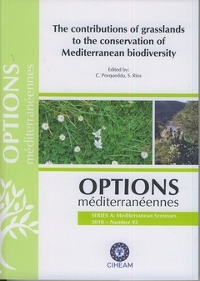| Article précédent | p. 45-48 | Article suivant |
Typologies of organic beef farms in Catalonia
Organic livestock farming is going through remarkable increase in the last decades in Europe. This is also the case in Catalonia. However, little work has been done explicitly on the characteristics of the livestock farms undertaking to organic production. In order to filling this lacuna, the nature of organic beef farms has been examined in Catalonia. In 2008 structured interviews to farmers were conducted (n=37, being 16 percent of the total number of organic beef farms) and data was submitted to PCA and Cluster Analysis. The aim of this study is to characterise the organic beef farms to disclose the different management and adjusting strategies being carried out. Three typologies of organic beef farms have been distinguished: a first group characterised by young farmers with an intensive management (24 percent); a second group of motivated farmers to produce organically that have the continuity of the farming activity guaranteed (27 percent); and finally a third group of discouraged farmers that see their continuity threatened (49 percent). Results suggest that half of the organic beef farms in Catalonia convert to organic production manly for financial reasons, to continue with the farming activity.
L'élevage biologique connaît une augmentation très importante ces dernières années en Europe. C'est également le cas en Catalogne. Cependant, peu de travaux ont été faits explicitement sur les caractéristiques des exploitations d'élevage qui entreprennent la conversion à la production biologique. Afin de combler cette lacune, la nature des exploitations de boeuf biologique a été examinée en Catalogne. En 2008, des entretiens dirigés ont été menés auprès des éleveurs (n = 37, soit 16 pour cent du nombre total d'exploitations de boeuf biologique) et des données ont été soumises à l'ACP et à l'Analyse Cluster. L'objectif de cette étude est d'analyser les attributs des fermes de boeuf biologique pour révéler les différentes stratégies d'ajustement et de gestion existantes. Trois typologies ont été découvertes : un premier groupe caractérisé par la jeunesse de ses éleveurs et la gestion intensive (24 pour cent) ; un deuxième groupe d'éleveurs motivés par la production biologique dont la continuité de l'activité agricole est garantie (27 pour cent) ; et enfin un troisième groupe d'éleveurs découragés qui voient leur continuité menacée (49 pour cent). Les résultats suggèrent que les subventions à l'élevage biologique de boeuf oeuvrent souvent en tant que dernière option pour poursuivre l'activité agricole.
- [ Afficher ]
- [ Télécharger ]
- [ Exporter la citation ]
Vous pouvez télécharger la citation au format :
- [ Imprimer ]
-
Mots-clés
AGRICULTURE BIOLOGIQUE, BOVIN, ELEVAGE, ENQUETE SUR EXPLOITATIONS AGRICOLES, ESPAGNE, EXPLOITATION AGRICOLE, TYPOLOGIECiter cet article
López-i-Gelats F., Bartolomé J. Typologies of organic beef farms in Catalonia. In : Porqueddu C. (ed.), Ríos S. (ed.). The contributions of grasslands to the conservation of Mediterranean biodiversity. Zaragoza : CIHEAM / CIBIO / FAO / SEEP, 2010. p. 45-48. (Options Méditerranéennes : Série A. Séminaires Méditerranéens; n. 92). 13. Meeting of the Sub-Network on Mediterranean Forage Resources of the FAO-CIHEAM International Network for the Research and Development of Pasture and Forage Crops, 2010/04/07-10, Alicante (Spain). http://om.ciheam.org/om/pdf/a92/00801212.pdf



